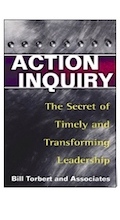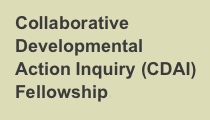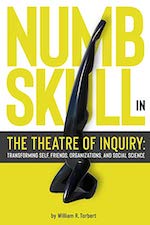In order for you to know why and how I do the different things I do (teach, consult, do research, write, host small intensive communities of inquiry, even garden), you need to know my fundamental concern. My fundamental concern throughout my adulthood has been how to learn and exercise timely action/leadership in everyday life i.e. how you or I can engage, in the midst of our daily practices:
- in first-person research (e.g. observing what I am doing and the effects I and my environment are having on one another, what I am thinking and feeling, and what I really want);
- in second-person research (e.g. encouraging mutual testing of attributions and assessments in real-time conversations and meetings, along with transformations toward increasingly mutual control of our friendship or colleagueship or collective organizational vision); and
- in third-person research (e.g. publicly testing propositions with persons not present through measures, statistics, and qualitative comparative analyses, as well as through creating learning organizations [communities of inquiry] that interweave first-, second-, and third-person research).
I have come to name this process of interweaving research and practice in one’s everyday work, family life, and leisure…action inquiry. Practicing action inquiry is what my teaching is about, what my research is about, what my consulting and Board memberships are about, what my spiritual search is about, and what my friendships are about. Through a gradual movement in practice, from a predominant use of unilateral power that generates conformity… to an increasing exercise of mutually-transforming power, action inquiry can generate peaceful and fruitful transformation in our lives, our vocations, and our organizations, as we increasingly co-create communities of inquiry with one another.
(Of course, anyone who is so monomaniacal must have a significant shadow side ( : ))…so that gradually glimpsing and coming to terms with the uninquiring/habitual aspects of myself/yourself becomes, paradoxically, an ever-more-prominent aspect of the inquiry.
Put differently, action inquiry is about discovering, not just knowledge, but wisdom – an integrity, more and more of the time, of attentive being, knowing, doing, and accomplishing. Or, to put the matter in still another way, action inquiry is about discovering, not just temporary objectivity, but the ongoingly conscious, spontaneously timely interplay among integral subjectivity (passion), mutual intersubjectivity (compassion), and sustainable objectivity (dispassion).
Ultimately, action inquiry is another name for Lao-Tsu’s “real path.” The real path in life, he tells us (in the Ursula LeGuin translation), is “a path that cannot be followed” – a path each of us blazes through our inquiries in action with our companions.








{ 0 comments… add one now }